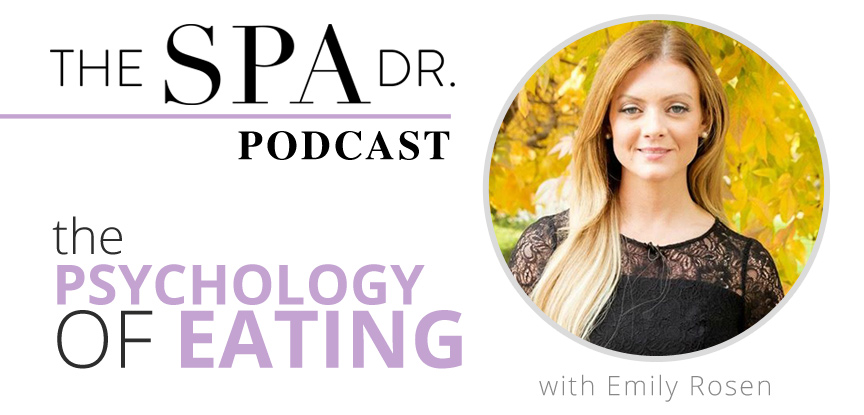Episodes

Thursday Dec 10, 2015
The Psychology of Eating with Emily Rosen
Thursday Dec 10, 2015
Thursday Dec 10, 2015
Our guest Emily Rosen is the director of the Institute of the Psychology of Eating. Emily entered the field of eating psychology after struggling with her own eating disorder for over a decade. By sharing her personal story and through her work with the Institute of the Psychology of Eating, she is shedding light on how mood and emotions are linked with our eating habits.
In today’s podcast Emily shares with us:
- How stress affects the way we eat and digest food
- A simple method for relieving stress before eating
- Why you should enjoy what you eat
Discover three simple ways to enhance your digestion at minute 26.
Stress and Nutritional Health
We all know that stress is a precursor to many diseases, but it also plays a major role in nutritional health. Some stress is a reaction to real danger (e.g. flight or flight response), but a lot of stress also comes from imagined danger (e.g. negative thoughts or anxiety).
The issue is that regardless of whether the source of your stress is real or imagined, the adverse chemical effects on your body are the same. Stress of any kind will trigger your body to produce more cortisol and insulin, which both signal the body to store weight and not build muscle.
In short, negative thoughts build stress chemistry. To combat them, it helps to pay attention to your inner dialogue. Work on stifling negative thoughts and introducing positive thoughts that you believe.
The Importance of Awareness
Achieving awareness is the first step in getting to the root of your relationship with food. A few of the common ways people can develop unhealthy relationships with food are to use eating as a symbolic substitute for something missing in their life, or using food as an easy way to get satisfaction.
A Simple Method for Counteracting Stressful Eating
1. Sit down and look at your food.
2. Take 6-10 deep breaths. This will trigger a relaxation response and help you destress.
3. Say gratitude for what you’re eating.
Emily notes the importance of cephalic face digestion, which includes taste, pleasure, aroma, satisfaction. If your brain does not register these four factors as you eat, you will not feel full. So instead of eating in a rush or in front of a television, take the time to really smell, taste, and enjoy your food.
The Metabolic Power of Pleasure
We are hardwired to seek pleasure and avoid pain. Sex and food are both associated with pleasure, so by denying yourself pleasure in food, you will start to seek pleasure elsewhere. Emily emphasizes that eating should be a pleasurable experience. In fact, pleasure is a metabolic enhancer and studies have shown that when people eat food they enjoy, they absorb 30%-40% more nutrients.
Pleasurable food also catalyzes a relaxation response, allowing you to digest your food better.
Overeating
Overeating is often a self-fulfilling prophecy. Negative thoughts associated with eating trigger a stress response, which in turn triggers a need for even more food. It is important to understand that food is not just for sustenance – it is an emotional experience as well.
“As we get healthier of mind, we’re actually drawn more to healthy foods”
Emily recommends journaling to help you get to know yourself, understand what drives you, and what your beliefs. Getting in touch with yourself can help identify the reasons behind overeating, and put you on the path to a healthier mind and a healthier body.
Links to Check Out
The Institute for the Psychology of Eating offers practioner training programs as well as an 8-week program designed for people who want to work on their relationship with food. The site also has lots of free resources related to eating psychology, including free video podcasts and conferences.
Emily Rosen
Emily Rosen is the director of the Institute of the Psychology of Eating. As someone who suffered from an eating disorder for over a decade, she has unique insight into the struggles and challenges people can have with food. In the past she has worked as a long term director for weight loss camps and taught dynamic eating psychology. Her expertise in the field of eating psychology has also led to numerous invitations to speak and present internationally.


No comments yet. Be the first to say something!